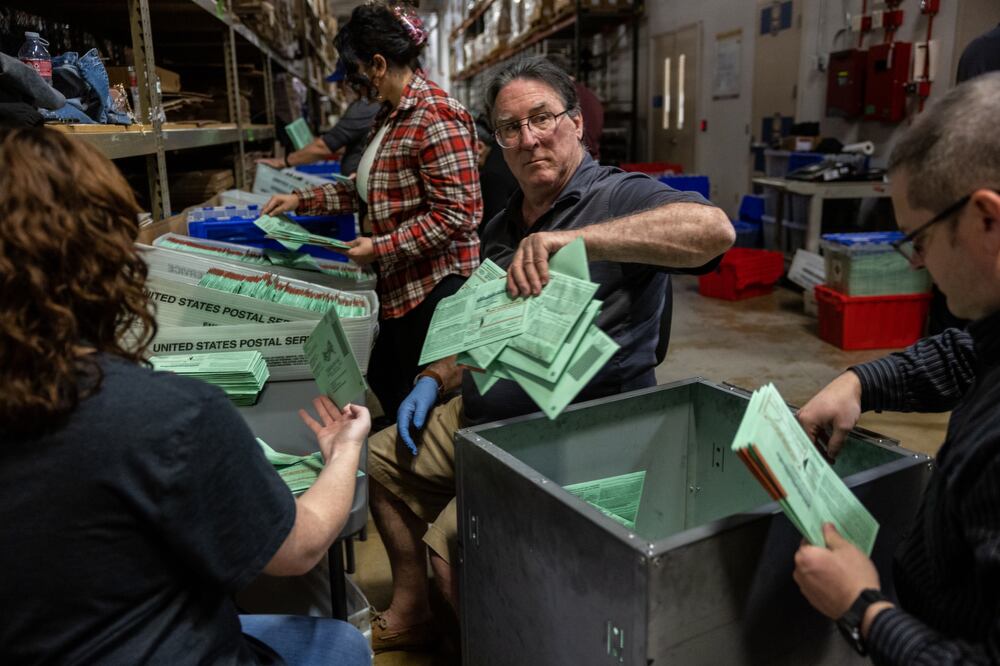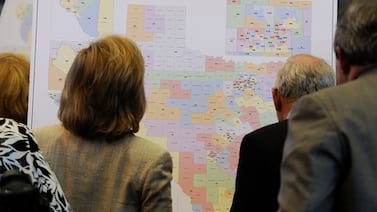A version of this post was originally distributed in Votebeat’s weekly newsletter. Sign up here.
Never – not one time – have I been happier to be wrong about something. I thought, perhaps, that this would be the year that things get weird on election night. And, while there were some pretty big problems in Maricopa County, Arizona and some pretty medium size problems in Harris County, Texas, it was a real snoozefest most everywhere else.
And thank God for that.
But of course, things aren’t over until they’re over, and a slew of high-profile races around the country are too close to call. As it happens, some of those races — including a tight U.S. Senate battle that could determine control of the chamber — are in Arizona, contributing to ratcheting-up tensions over how voting went in Maricopa County amid Tuesday’s problems.
There, as our own Jen Fifield masterfully reported last night, ballot-printing problems caused tabulation errors and confusion. As expected, ballots are still being counted but it’s making an already tense environment, well, not great.
“Reports are coming in from Arizona that the Voting Machines are not properly working in predominantly Republican/Conservative areas,” former President Donald Trump posted on Truth Social as word of the problem spread yesterday. “Can this possibly be true when a vast majority of Republicans waited for today to Vote? Here we go again? The people will not stand for it!!!”
Appealing straight to his base worked as intended. Republican gubernatorial candidate Kari Lake, who has repeatedly promoted election conspiracy theories, is using the mishap to her advantage in a too-close-to-call race against Secretary of State Katie Hobbs, a Democrat. Secretary of state candidate and fellow Republican 2020 conspiracy theorist Mark Finchem is trailing Democrat Adrian Fontes, dampening his ability to get traction with similar disinformation, though that race is also still uncalled.
More surprising than all of that, was how perfectly normal things were elsewhere in the state — even in Pinal County, which melted down during the primary, and in Cochise County, which had been thrown into turmoil over a confusing attempt to hand-count ballots.
In Texas, another big county — this time, Harris — is in the spotlight. There, issue-plagued Harris County Elections experienced issues. Polls stayed open an extra hour because supply shortages and machine issues had caused delays earlier in the day. Court orders now threaten to confuse the results. Votes are still being tabulated, and voters are displeased.
In Michigan, all three statewide candidates who alleged the 2020 election was stolen from Trump — that would be Tudor Dixon, Matthew DePerno, and Kristina Karamo — lost to the Democratic incumbents. It was — as elsewhere — a smooth evening in Michigan, despite rumors online after Detroit’s e-poll books experienced isolated issues.
And, in Pennsylvania, paper shortages in Luzerne County led to delays. And while a last minute change to counting processes in Philadelphia made a bunch of people nervous, things were ultimately fine. Some counties, like York and Lancaster, even made quick work of counting in a state that has historically been pretty slow at that very thing. Meanwhile, the state is still dealing with ongoing litigation over whether to count undated and misdated mail ballots, and Republicans have said they will challenge provisional ballots submitted by voters who had cast mail ballots set to be rejected.
Here are a few things we’re still watching:
- In Nevada, election conspiracy theorist Jim Marchant is closer than ever to running elections in the state. Results are expected to take days. Voters sent more-than-expected mailed ballots, and counties are facing massive delays.
- Raphael Warnock is in for yet another U.S. Senate runoff in Georgia, this time against Republican Herschel Walker. But election changes passed by Republican legislators will mean this runoff looks quite a bit different than the one after 2020. For starters, it will last four weeks instead of nine.
- As Jen pointed out to me last night, the technical issues in Maricopa appear tailor-made to needle at the existing pain points in Arizona, where right-wing activists have long cast doubt on counting processes and tabulators. We’ll continue to watch these storylines unfold, debunking as appropriate.
A lot of election administrators read our work, so we’ll close with a shout-out to them. It was a pretty boring night, and we thank you for it.
Did we miss anything? Let us know.
Jessica Huseman is Votebeat’s editorial director and is based in Dallas. Contact Jessica at jhuseman@votebeat.org.







